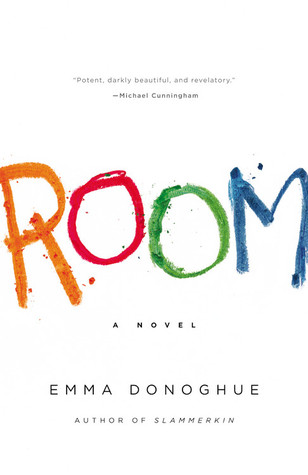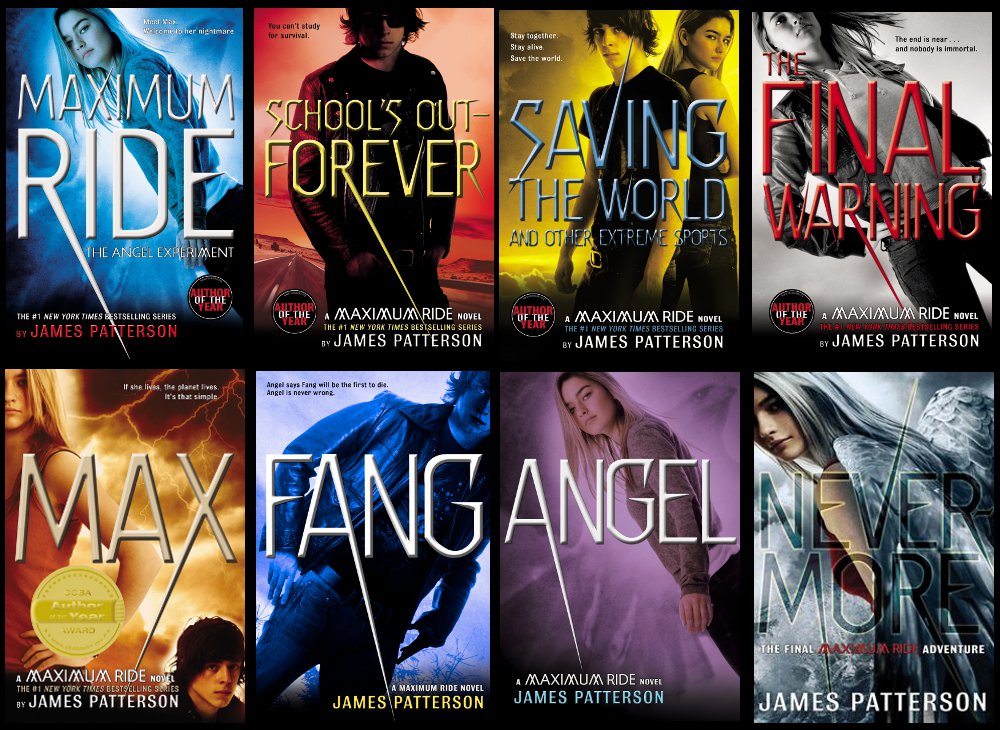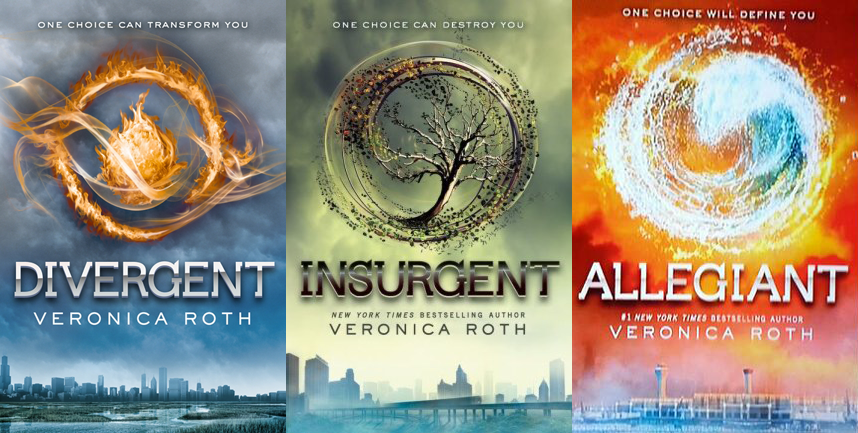Allegiant
by Veronica Roth and Maximum Ride: The
Angel Experiment by James Patterson are two completely different genres,
dystopian/utopian and fantasy, but the characters and plot can connect in some
ways. Allegiant is the third and
final book in the Divergent series and Maximum
Ride: The Angel Experiment is the first book in the Maximum Ride series.
The Divergent series was Veronica Roth’s debut books and she has also written
short stories that go with the series but in a different characters point of
view. Roth wrote the first book, Divergent,
in her senior year of college and her career boomed. James Patterson on the
other hand has written so many books. Some of the popular ones are the Maximum
Ride series, the Alex Cross series, and Confessions. These may be very
different authors and genres but they also have a lot of similarities in the
plot and characters.
Maximum Ride: The Angel Experiment is about a group of kids whose genes have been
changed so now they are 98% human and 2% bird, which means they have wings and
some other extraordinary powers. Now that they escaped, Max who is the oldest
of the kids leads them away and they try to stay alive and hidden. Max is and
odd leader of the book. Sometimes she can be very worried and sacrifice herself
for the group, but other times she is very stern and has to make sure that
everyone is listening to her. For example when Max was talking about how and
when they were going to save Angel, she said, ‘“This is not a democracy.’ I
said, understanding his fear but unable to do anything about it. ‘It’s a
Maxocracy. You know we have to go after Angel. You can’t be thinking that we
would just let them take her. The six of us look out for one and another – no
matter what.’” She is very demanding but also understands everyone’s fears.
The
Divergent series is a futuristic society where you have to choose a faction and
follow their rules and lifestyle for the rest of your life. The characters take
a test at age 16 to find out which faction you belong to but sometimes you have
the characteristics of more than one. This is Divergent and the Divergent are
different from normal people and the leaders don’t like that so they start to
kill Divergent. Tris, who is Divergent, starts to rebel and has more secrets
than she can keep. Tris doesn’t consider herself a leader but everyone around
her does and they all look up to her. This is what makes her different because
she can act like a leader if she wants to but sometimes she just doesn’t do it.
Tris just says what she needs to say and gets it over with but she also
incredibly smart in her choices.
Max
and Tris are similar because they are both brave even when they don’t want to
be. They are both selfless when they don’t want to be. Tris and Max have to put
their friends in front of them and make sacrifices. When one of their friends
is in trouble, they lose their inhibitions from the fear of losing that friend,
and start acting before they think. Sometimes this can be a good thing and
sometimes it’s not.
The
authors have two, very different writing styles. Maximum Ride: The Angel Experiment has a very young writing style,
like a 14-year old girl is actually writing the book and that is pretty cool.
It’s almost as if you are there with the characters because they talk like how
you would talk in person. For example on page 232 Max says, ‘“We’re headed for
the Big Apple, guys. The city that never sleeps. I think we’re maybe six, seven
hours away.’ Twenty minutes later, we were taking off, one by one. I was last,
after Angel, and I ran bout twenty feet, then leaped into the air, beating my
wings hard.” Imagine being there with them, as you wake up and take off to go
to New York.
Allegiant
on the other hand is written with a much serious tone. It is written as if
everyone is on their tippy-toes and someone might die on the next page. (And
someone might die). This just gives the book the edge it needs for people to
keep reading it. Though you may not feel like you can be right next to the
character, you can definitely relate to the characters.
The
author’s purpose in Maximum Ride: The
Angel Experiment was to make it a page turner and keep kids reading. In an
interview with Scholastic,
the author James Patterson says, “The pages in the Maximum Ride books practically turn themselves.
That is extremely important if you are trying to get kids excited about
reading.” He continues to talk about his characters saying, “In my books, the
characters are very, very involving. The combination of narrative power and
character development are the key ingredients that make kids and adults want to
keep reading. The author’s purpose in the Divergent series was to
create a character like Tris and she wanted Tris’s voice to be heard. She came
up with all her ideas as she was taking the class Psych 101.
To
conclude, these books have many similarities and differences. I love how the characters
can act the same or different depending on the situation they are in. The plot
is also the same as the main characters are trying to overcome fear. They are
also trying to fight for their respect and get the answers they deserve/need. In
both books, these secrets could kill or save them. I would give both of these
books four and a half stars.







